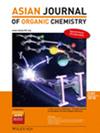Photocatalytic Deoxygenative Alkylation with Alcohols via Xanthates or Thionocarbonates
IF 2.8
4区 化学
Q1 CHEMISTRY, ORGANIC
引用次数: 0
Abstract
Recent advancements in photocatalytic strategies have expanded the range of alkylating agents, including alkyl carboxylic acids and saturated hydrocarbons. Notably, alcohols are preferred for their availability, stability, and safety compared to traditional alkylating reagents such as alkyl halides. This review summarizes recent developments in photocatalytic deoxygenative alkylation using alcohols, specifically through the formation of xanthates or thionocarbonates.
求助全文
约1分钟内获得全文
求助全文
来源期刊

Asian Journal of Organic Chemistry
CHEMISTRY, ORGANIC-
CiteScore
4.70
自引率
3.70%
发文量
372
期刊介绍:
Organic chemistry is the fundamental science that stands at the heart of chemistry, biology, and materials science. Research in these areas is vigorous and truly international, with three major regions making almost equal contributions: America, Europe and Asia. Asia now has its own top international organic chemistry journal—the Asian Journal of Organic Chemistry (AsianJOC)
The AsianJOC is designed to be a top-ranked international research journal and publishes primary research as well as critical secondary information from authors across the world. The journal covers organic chemistry in its entirety. Authors and readers come from academia, the chemical industry, and government laboratories.
 求助内容:
求助内容: 应助结果提醒方式:
应助结果提醒方式:


